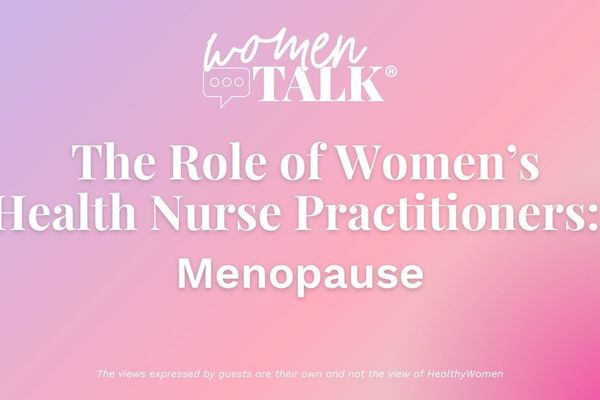Menopause officially starts when you’ve gone 12 months without a period, but it can creep up in a slow collection of physical and emotional changes long before that. Good medical care is critical to understanding what’s going on, getting relief and feeling your best.
Knowing that I’m around the average age of menopause onset (early 50s), I often wonder if some subtle shift or new experience I’m having is the result of hormonal changes. Did I wake up sweating last night because I’m in perimenopause, or was the heat too high? Are hormones making it harder to maintain my target weight, or am I eating more than I realize (looking at you, snack drawer)?
According to Claudia Levine, M.D., board-certified internal medicine physician and co-founder of menopause education resource Pausology, it may not be obvious at first that you’re in perimenopause, the phase leading into menopause that can begin in your late 30s or early 40s. If you’ve had regular periods (which not everyone does), changes to your cycle can help you recognize what’s happening.
“[Perimenopause] starts probably earlier than you expect, and it takes a long time,” Levine said.
Watch: The 3 Stages of Menopause >>
Getting good menopause care
Once you’re in menopause, you stay there for the rest of your life. But not every healthcare provider (HCP) has expertise in or comfort with menopause. If yours doesn’t, they may not be up to date on the latest treatment guidance, and you may miss out on care that could relieve menopause symptoms.
Hormone therapy gets a lot of attention, but other approaches include non-hormonal medications, antidepressants, supplements, diet and exercise, services such as cognitive behavioral therapy and clinical hypnosis, and products such as fast-drying fabric and special sheets or pajamas to manage night sweats.
“There are many tools, but that’s where you need somebody that can help you navigate,” said Shannon Cothran, MD, board-certified OB/GYN and founder of Meno-Start, a membership model menopause clinic and wellness provider.
How can you be sure your HCP is equipped to provide good menopause care? Cothran recommends seeing a licensed healthcare professional rather than a medical spa, gym or online pharmacy without medical guidance.
Levine suggests looking for signs that your HCP is attuned to menopause, such as asking what your periods are like or if you’re aware of changes that you think might be related to hormonal changes.
“Menopause-informed care is anybody who’s aware of this as a life stage that’s going to potentially impact how you feel,” she said.
As with any relationship, you should also feel like your HCP really listens to you and takes you seriously.
“If you feel like you’re not being heard, or you’re just getting [the runaround], that’s the biggest danger sign,” Cothran said
If you feel like you’re being dismissed, she recommends scheduling a separate appointment to discuss menopause.
“[Menopause] is really a whole-body problem, and you need more time to [address] that,” she said.
HCPs don’t always have that time in an annual checkup or birth control refill visit. A separate visit lets your HCP prepare and gives you the space to address your concerns.
“If the office won't schedule that, that's a red flag,” Cothran said.
Another bad sign: If your HCP oversimplifies solutions or suggests that medication alone will make everything better.
“Someone who does this kind of work and knows about hormonal care and menopausal and perimenopausal care [is] not just going to say, ‘Do one thing.’ They're really going to look more holistically at how to help you feel your best,” Levine said. “It really does require looking at the big picture of your life.”
According to Levine, you should also watch out for HCPs who are not comfortable prescribing hormone therapy.
“If you get a sense that they think hormones are not safe, that's definitely a red flag,” she said.
Trust your gut if you suspect your HCP may not be expert in menopause. According to Levine, it’s okay to ask, “Do you do a lot of menopausal care in your practice? Is it something that you feel comfortable with and knowledgeable about?”
If they tell you it’s not their area of expertise, ask if the health system has menopause experts they can refer you to. Levine said you might have luck calling your health plan and saying, “I'm really not happy with my care. Is there somebody that you can identify as more knowledgeable?”
Both Levine and Cothran recommend searching the Menopause Society’s website for menopause-certified HCPs in your area who accept your insurance and who are accepting new patients. People in your community may also have recommendations.
If you’re not getting what you need from your HCP and don’t have the luxury of switching, Levine suggests advocating for yourself by saying: “This is really impacting me, and I need to talk about it more. I need to come up with a better plan.”
Is menopause care covered by insurance?
The Affordable Care Act (aka “Obamacare”) requires insurers to cover preventive services, but menopause care can cross categories that may not all be covered: hormone and non-hormonal therapy, physical and mental health care, and other therapies or services for symptom management.
Coverage depends on factors including what treatment you’re seeking, where you live, whether the HCP is in-network and what type of coverage you have.
Levine said that some of her patients covered by California’s Medicaid have better coverage for certain treatments than others with insurance through a job.
To improve your odds of coverage, see in-network HCPs if possible. If not, request a coverage exception if you can show that their expertise is not available in the network. You may be able to get at least partial reimbursement for bills you pay yourself, but check with your health plan before you incur costs.
If your plan doesn’t cover medication you need, your HCP may help you request coverage or appeal a denial based on their medical judgment.
Some menopause-focused telemedicine providers now accept insurance, which may be a cost-effective way to access specialized care.
Overall, Cothran sees reasons for optimism.
“Even up to five years ago, we didn't have a lot of options to give people. I think that's part of why we kind of shoved [menopause] under the rug,” she said. “Now there's a lot of hope and you don't have to feel terrible. There are options, no matter what your history is. So, keep looking if you are not feeling well. You know you can feel better.”
This educational resource was created with support from Astellas, a HealthyWomen Corporate Advisory Council member.
- What You Need to Know to Prepare for Menopause ›
- What You Need to Know About Menopause ›
- True or False: Menopause ›
- Curious About Hormone Treatment? ›
- From Hot Flashes to Night Sweats, a Rundown of Vasomotor Symptoms During Menopause ›
- Women Deserve Care from Healthcare Providers Who Understand Menopause ›







